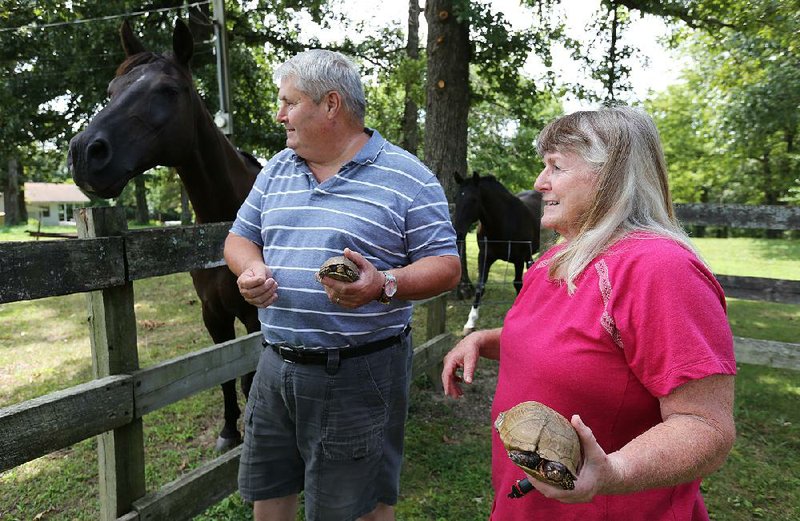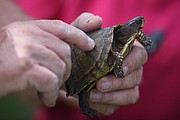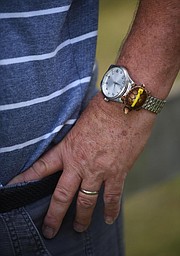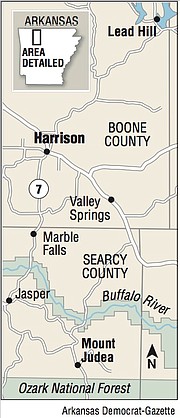HARRISON -- Turtles don't race here anymore.
The turtle races have stopped in Lead Hill and Mount Judea, too.
The races ended after a Harrison couple began a campaign to inform people of the effects the races were having on some of the turtles -- starvation, injury and abandonment.
Terri and Alan Gregory started the campaign in Harrison. They said like-minded acquaintances started similar efforts in Lead Hill and Mount Judea.
"We didn't want a stink," said Terri Gregory. "We just wanted it to stop."
For a century, turtle races have been a draw for kids at county fairs and community picnics across middle America. The turtles are usually placed within a marked circle on the ground, and the first turtle that crawls out of the circle is the winner.
Being animal lovers, the Gregorys attended the Fourth of July turtle races in Harrison a few years ago.
They saw hundreds of turtles being raced on the hot pavement on the south side of the downtown square. Some children dropped turtles onto the pavement, which could injure internal organs, causing a slow and painful death over several months, said Alan Gregory.
"We were just in shock," said Terri Gregory. "We were just horrified by the whole thing."
Most of the turtles had been picked up along rural roads and carried to the races, she said. In the spring, female three-toed box turtles migrate to another pond to lay their eggs, said Alan Gregory. Along the way, they often cross highways.
Picking up turtles and transporting them miles away prevents them from being able to lay their eggs, he said.
Then, the turtles are often kept in a box for a month or two and fed lettuce, which they don't eat. (They prefer canned dog food and worms, said Terri Gregory.)
By the time the races rolled around on July 4, the turtles were in bad shape, said the couple.
After the races, many people abandoned the turtles in downtown Harrison, where they had many roads to cross to get back home and little chance of survival. Terri Gregory said near-dead turtles were left in boxes at the doors of businesses along the downtown square.
So, in 2017, the couple started going to the Harrison turtle races and taking home the abandoned and unwanted turtles. They got 79 turtles that first year. Some of them were painted in bright colors that would have attracted predators.
"We took them home and said, 'All right, start sorting. Who's hurt? Who's been painted? Who's had holes drilled in them?'" said Terri Gregory.
She is a licensed turtle rehabilitator. Alan Gregory describes himself as his wife's executive assistant. They operate Boone County Turtle Rescue and Rehabilitation.
They rehabilitated the injured and weak turtles and released them into the wild. The turtles have a better chance of survival if released in their home area, but the couple didn't know where the turtles had come from.
Alan Gregory said they started a letter-writing campaign in May in get Arvest Bank to stop sponsoring the turtle races in Harrison. He said some people were "quitting the bank" over the issue.
Apparently, it worked.
Scott Tennyson, president of Arvest Bank in Harrison, said the bank decided not to sponsor the turtle races this year, so the races didn't take place.
"There was some community push-back to the turtle races, and there was a lot of commitment, time and things like that," he said.
First Federal Bank started the turtle race tradition in Harrison in 1982, according to the Harrison Daily Times. First Federal was acquired by Bear State Bank, which was acquired by Arvest in early 2018.
Matt Bell, executive director of the Harrison Convention and Visitors Bureau, said the event had "kind of lost its luster."
He said Harrison's Fourth of July festival continued as usual this year, just without the turtle races.
Bell said people were disappointed, but there was no "real outcry of any kind."
"I think there was a lot of pressure from PETA to stop torturing these tortoises," he said.
Sofia Chauvet, a spokesman for People for the Ethical Treatment of Animals, said the organization had nothing to do with ending the turtle races in Harrison.
But she did provide a statement from Sarah Preston, PETA's associate director: "Taking turtles from their forest home, cramming them into small boxes and subjecting them to handling by strangers amid a screaming crowd is cruel -- and it exposes participating children to disease-causing bacteria such as E. coli and salmonella. Arvest Bank made the right call to stop sponsoring the Harrison turtle races, and PETA urges families to steer clear of these dangerous, exploitative events."
Alan Gregory said he doesn't see as many box turtles on his rural property as he did when they moved there in 1986.
There's no current data to support the theory that the box turtle's population has declined in the state, according to the Arkansas Game and Fish Commission.
Kelly Irwin, herpetological program coordinator for Game and Fish, said three-toed box turtles often stay within the same 10- to 25-acre range for life and have a strong homing instinct.
"If they are moved outside of this area, they may spend the rest of their lives wandering, trying to reorient themselves, especially if turtles are already present in the area where they are placed," according to a July news release from Game and Fish.
A recent study found that only 47% of box turtles that had been moved established a home range in the new area, according to the news release. The rest wandered away or died.
Irwin said the issue is compounded by the turtle's relatively long time to reach sexual maturity.
"Box turtles can take between 5 and 10 years to become sexually mature, depending on their sex and the conditions where they live," he said. "They can have multiple clutches of 2 to 6 eggs per year, but the nest and young are susceptible to raccoons, skunks, foxes, snakes and many other small predators."
Box turtles generally live for 25-35 years but have been known to live more than 100 years, according to the Smithsonian's National Zoo and Conservation Biology Institute. But only one out of 100 make it to adulthood (age 5 or 6), said Alan Gregory.
Dr. Jenn Ballard, state wildlife veterinarian for Game and Fish, said people who've had turtles as pets shouldn't release them in the wild because they could spread diseases or parasites picked up during its time as a pet. Instead, the turtles should be given to a permitted rehabilitator to ensure the turtles' survival and that they don't spread diseases or parasites.
The only people specifically permitted as turtle rehabilitators in Arkansas, according to Game and Fish's website, agfc.com, are Terri Gregory, Joyce Hicks of Bella Vista, and Lisa and Timothy Figgins of Springdale.
Alan Gregory said they've rehabilitated hundreds of turtles. Most were victims of cars, lawnmowers or dogs.
Game and Fish called the Gregorys after a box turtle was hit by a car in May near Ponca in Newton County. That turtle, nicknamed Ponca, had a cracked shell that the Gregorys managed to epoxy back together. They gave it medicine, food and nursed it back to health. It will be released Wednesday after a 10 a.m. presentation called "The Secret Life of Turtles" at the Elk Education Center at Ponca, which is near Boxley Valley on the Buffalo River.
"Most people didn't think she would survive," Alan Gregory said of Ponca the turtle. "They didn't think it was worth driving her over here to us, but they did."
Reggie Wilkerson of Affordable Veterinary Services of North Arkansas is the Gregorys' veterinarian. The Gregorys said she's helped save many of their turtles.
State Rep. Keith Slape, R-Compton, whose district includes Mount Judea, said he was sad to hear that the turtle races were coming to an end.
"It's a tradition I hate to see go away but I can understand why they're doing it because they're programmed to go to certain areas to lay their eggs," said Slape. "You're changing the ecology of things."
Perhaps the oldest and most famous turtle races in Arkansas are at the Lepanto Terrapin Derby. It has been held every year since 1930, according to the Central Arkansas Library System Encyclopedia of Arkansas.
But it's different from the event that was held in Harrison. Local residents don't collect turtles from roads for the Lepanto races.
"Today, the turtle race is still a major part of the Terrapin Derby, except now the turtles are supplied by a local individual, and the entrants pay to draw a number that corresponds to a number painted on the back of a turtle," according to the encyclopedia. "Prizes are still offered to the top three finishers. The festival also includes a 5K run, music, food, crafts, a street dance, and a beauty pageant. It draws several thousand people to the town each October for the festivities."
The Gregorys said one of the questions they get asked most often is whether people should stop their vehicles and help a box turtle that's in the road.
If it's safe for the driver to stop, then it could save the turtle's life if someone could carry it another few feet to the edge of the road, said Alan Gregory.
It's OK to place the turtle another 20 feet from the roadside in a grassy or wooded area, he said.
But special care should be taken with snapping turtles, for obvious reason. Terri Gregory said a tub or snow shovel comes in handy when trying to move a snapping turtle out of the road.
They have extraordinary long necks, she said.
SundayMonday on 08/04/2019




